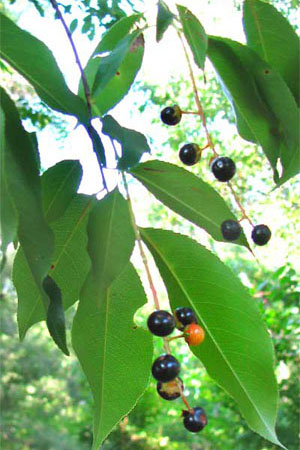Prunus serotina
|
Overview
 Libraries
The following libraries are associated with this organism.
Description
Prunus serotina is a cherry native to eastern North America, valued for its timber. P. serotina has small white flowers that hang from narrow clusters. Trees bloom in the late spring and have dark, almost black fruit when ripe in late summer. The fruit is classified as a drupe with a pit that germinates readily when distributed by animals that consume the fruit. P. serotina is a tetraploid (2n = 4x = 32) and consists of both self-compatible and self-incompatible cultivars. It is unknown if it is an allotetraploid or an autotetraploid. Because of its wide distribution both in the United States and in Europe, it can be found on roadsides and in forested areas. However, because the foliage contains cyanogenic glycosides that can be converted to poisonous hydrogen cyanide when consumed, farmers must remove these trees in areas where livestock graze. The fruit of P. serotina are used as a flavoring, particularly for soda, ice cream and in chocolate cakes like Black Forest cakes. Timber extracted from P. serotina trees are particularly valuable in cabinetry and furniture for its deep red color when finished. As with other Prunus species, black cherry trees are affected by powdery mildew (Podosphaera clandestine), Armillaria (Armillaria spp.) root rot, botrytis blossom blight, brown rot (Monilinia fruticola or M. laxa), bacterial canker (Pseudomonas syringae), and several viruses. Transcripts
|
